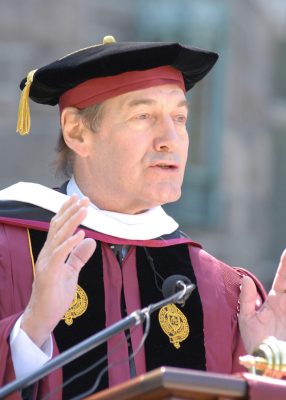Fordham Rescinds Charlie Rose’s Awards
Charlie Rose, who was Fordham’s commencement speaker and an honorary degree recipient in 2008, was recently accused by multiple women of sexual misconduct. (JON ROEMER/FORDHAM UNIVERSITY)
December 21, 2017
Updated 11:27 a.m., 12/21/2017 to reflect WFUV’s statement on rescinding Charlie Rose’s Charles Osgood Award for Excellence in Broadcast Journalism.
Joining a growing number of universities, Fordham University has voted to rescind Charlie Rose’s awards in the wake of eight women accusing Rose of sexual misconduct in the Washington Post. On December 14, the Board of Trustees voted to rescind the broadcast journalist’s honorary doctorate that he received from the university in 2008. WFUV has also rescinded the Charles Osgood Award for Excellence in Broadcast Journalism it gave Rose in 2015.
This is only the second time in the university’s history that Fordham has voted to rescind an honorary degree, with both instances due to sexual misconduct allegations. In September 2015, the Board voted unanimously to withdraw the honorary doctorate of fine arts that the university had awarded Bill Cosby in 2001, when he was the commencement speaker.
SUNY Oswego has also voted to rescind the honorary degree is awarded Rose in 2014, and Montclair State University and North Carolina State University are both deliberating on the topic.
“As a university—especially a Jesuit university—Fordham could no longer stand behind the degree and award it had bestowed upon Mr. Rose.”
WFUV joins Arizona State University, the University of Kansas, and Duke University in rescinding journalism awards they gave to Rose. Arizona State University’s journalism school rescinded the Walter Cronkite Award for Excellence in Journalism it gave to Rose in 2015, while the University of Kansas rescinded the William Allen White National Citation it had bestowed on Rose earlier this year. Duke University rescinded the Futrell Award for exemplary journalism that it gave to Rose in 2000.
“Though Mr. Rose is among the premier broadcast journalists in the United States, the revelation in November that eight women have credibly accused him of unwanted sexual advances and harassment from the 1990s to 2011 render him an inappropriate recipient of Fordham honors,” a university statement emailed to the Fordham community on Thursday morning reads.
“As a university—especially a Jesuit university—Fordham could no longer stand behind the degree and award it had bestowed upon Mr. Rose,” the statement concludes.
“WFUV will always have a culture that welcomes talented young journalists, producers and other media professionals, and supports their advancement, without fear of encountering such obstacles.”
WFUV also issued a statement from General Manager, Chuck Singleton.
“We are sorry to see a distinguished career tainted by the allegations of sexual misconduct,” Singleton’s statement reads. “An important part of WFUV’s mission is to train the next generation of multimedia professionals, and it’s critical that our honorees model the best workplace behavior.”
“WFUV will always have a culture that welcomes talented young journalists, producers and other media professionals, and supports their advancement, without fear of encountering such obstacles,” his statement concludes.
Since the multiple accusations of sexual misconduct were published, Rose was fired from CBS, PBS and Bloomberg. In their accounts, the women who accused him said Rose had made “unwanted sexual advances toward them, including lewd phone calls, walking around naked in their presence, or groping their breasts, buttocks or genital areas.”
“It is essential that these women know I hear them and that I deeply apologize for my inappropriate behavior,” Rose said in a statement to the Washington Post. “I am greatly embarrassed. I have behaved insensitively at times, and I accept responsibility for that, though I do not believe that all of these allegations are accurate. I always felt that I was pursuing shared feelings, even though I now realize I was mistaken.”
“I have learned a great deal as a result of these events, and I hope others will too,” his statement continues. “All of us, including me, are coming to a newer and deeper recognition of the pain caused by conduct in the past, and have come to a profound new respect for women and their lives.”
Full statement from the university:
On December 14, 2017, the Fordham University Board of Trustees voted to rescind the honorary doctorate awarded to broadcaster Charlie Rose in 2008. WFUV, the noncommercial, member-supported public media service of Fordham University, has also rescinded Mr. Rose’s Charles Osgood Award for Excellence in Broadcast Journalism.
Though Mr. Rose is among the premier broadcast journalists in the United States, the revelation in November that eight women have credibly accused him of unwanted sexual advances and harassment from the 1990s to 2011 render him an inappropriate recipient of Fordham honors.
As a university—especially a Jesuit university—Fordham could no longer stand behind the degree and award it had bestowed upon Mr. Rose.
Full statement from WFUV:
WFUV has rescinded the Charles Osgood Award for Excellence in Broadcast Journalism given to Charlie Rose in 2015. The award is named for the longtime CBS journalist and WFUV alumnus.
“We are sorry to see a distinguished career tainted by the allegations of sexual misconduct,” said WFUV General Manager, Chuck Singleton. “An important part of WFUV’s mission is to train the next generation of multimedia professionals, and it’s critical that our honorees model the best workplace behavior.
“WFUV will always have a culture that welcomes talented young journalists, producers and other media professionals, and supports their advancement, without fear of encountering such obstacles.”













